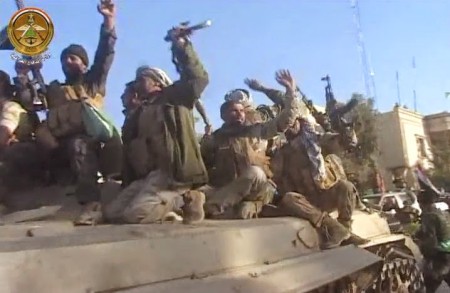Thousands of Shia militia have threatened to pull back from the offensive against the Islamic State in the northern Iraqi city of Tikrit, protesting US aerial intervention.
The Americans began attacks on Wednesday night, following a formal request from Iraqi President Haidar al-Abadi, to try to spur the stalled ground operations of the Iraqi army and allied militias.
The offensive has increasingly been framed in terms of a US-Iran rivalry for influence, given Tehran’s links to the militias and the involvement of its commanders in the Tikrit operation.
The mission was further complicated on Thursday with the accidental killing of nine Iraqi fighters by an airstrike.
Four militia groups, with more than 1/3 of the 30,000 fighters in the offensive, objected to the US intervention.
“We don’t trust the American-led coalition in combating ISIS [Islamic State],” said Naeem al-Uboudi, the spokesman for Asaib Ahl al-Haq. “In the past, they have targeted our security forces and dropped aid to ISIS by mistake.”
“We don’t need the American-led coalition to participate in Tikrit. Tikrit is an easy battle, we can win it ourselves,” said Mueen al-Kadhumi, a commander of the Badr Brigades, the largest Shia militia. “We have not yet decided if we will pull out or not,” he said.
The office of Prime Minister Haider al-Abadi announced Thursday night that he went personally to Tikrit, possibly to meet militia leaders.
Hadi al-Ameri, the Badr leader, denounced Iraqi commanders earlier this week when they mentioned US assistance: “Some of the weaklings in the army… say we need the Americans, while we say we do not need the Americans.”
Another militia leader went farther, threatening to attack US forces and their allies. “We are staying in Tikrit, we are not leaving and we are going to target the American-led coalition in Tikrit and their creation, ISIS,” said Akram al-Kabi, the leader of the Nujabaa Brigade.
In Washington, US military leaders insisted that the aerial intervention were going according to plan, saying that they welcomed working only with Iraqi Government forces.
General Lloyd Austin, the head of the US Central Command, told a Senate hearing on Thursday that no Shia militias remained in Tikrit, which has been held by the Islamic State since a lightning advance across northern and eastern Iraq last June.
A US official, asked if he was worried that Americans now are responsible for the Tikrit operation, said, “Yes. This was a calculated risk, but it’s one that had to be taken.”

